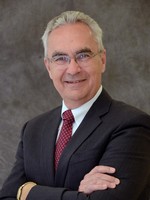Since heart failure is a growing chronic condition affecting more than five million people in the United States, Broward Health Imperial Point Medical Center (BHIPMC) recognized the need to create awareness on heart failure as a commitment to excellence of care in the community. A heart failure program was implemented to diagnosis, treat, educate and provide post-hospital follow-up care for patients living with this condition and ultimately promoting quality of life. BHIPMC was the first hospital in Broward and Dade Counties to receive this disease-specific certification, and they were recently awarded recertification by The Joint Commission.
 Louis Cioci, M.D., David Paris, M.D., and Joel Gellman, M.D., FACC, oversee the heart failure program at BHIPMC. Dr. Gellman is a Diplomate of the American Board of Medicine in Advanced Heart Failure – the first physician in Broward County and one of the first in Florida to achieve this.
Louis Cioci, M.D., David Paris, M.D., and Joel Gellman, M.D., FACC, oversee the heart failure program at BHIPMC. Dr. Gellman is a Diplomate of the American Board of Medicine in Advanced Heart Failure – the first physician in Broward County and one of the first in Florida to achieve this.Early diagnosis and treatment (adherence to medication therapies, reducing salt in the diet and getting daily physical exercise) can improve quality of life and life expectancy for people who have heart failure. BHIPMC created an interdisciplinary team to provide self-management training for patients living with heart failure. The team developed a care management tool that ensures patients have follow-up arrangements for their care prior to discharge. This includes access to medications and resources they need in order to focus on maintaining a normal quality of life.
Post discharge, patients are contacted by BHIPMC two to three days later, and then again three to four weeks later to make sure they have seen a health care practitioner and are keeping up with nutritional and exercise plans, as well as vaccinations.
“We now have a team in place to take care of patients’ specific needs and promote a self management approach to their condition. The program ensures that the right disciplines are involved early in the patient’s treatment plan and follow up care after discharge,” said Dr. Cioci. “If a patient or loved one is educated on their condition, it empowers them to ask questions so they are determined to take on a healthier lifestyle.”


























